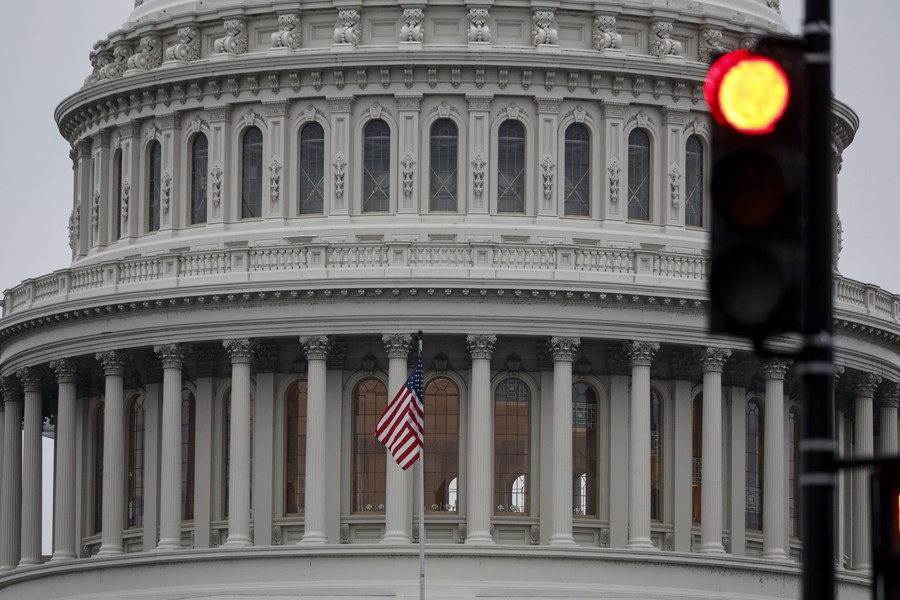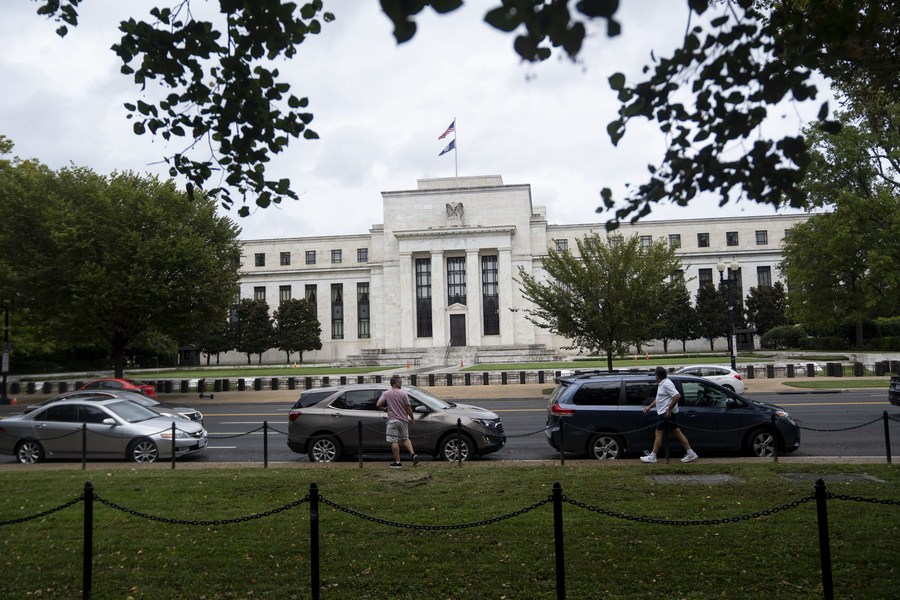
Photo taken on Jan. 19, 2023 shows the U.S. Capitol building in Washington, D.C., the United States. (Photo by Ting Shen/Xinhua)
by Song Guoyou
On Jan. 19, U.S. Treasury Secretary Janet Yellen sent a letter to Congress stating that the federal government's debt had reached its ceiling of 31.4 trillion U.S. dollars. Ten days have passed, and the U.S. Congress hasn't passed a bill to raise the debt ceiling, leaving the government with no new money to spend.
Compared with previous debt ceiling risks, this crisis brings more pessimism from the outside world. To a large extent, the U.S. debt ceiling risk is rooted in bipartisan domestic politics, America's debt-driven economic development model and the abuse of the dollar's status as the global currency.
Given the political shenanigans of the Republic and Democratic parties, debt ceiling negotiations in the United States are likely to be delayed until the "last moment."
When the debt limit is reached, it will be in a House of Representatives led by the Republicans, not the Democrats. The Republican Party insists that debt expansion should not become an "unlimited credit card" for the Joe Biden administration's various expenses, proposing that debt increases be tied to spending cuts.
In 2021, debt ceiling negotiations proceeded more smoothly as Democrats also controlled Congress. Previous experiences indicate that such negotiations in the United States take longer in a split Congress.
Driven by domestic political factors, the two parties are bound to engage in a protracted tug-of-war over debt ceiling negotiations to pursue their perspective interests. The Republicans, in particular, will use the debt ceiling crisis to force concessions from the Democrats.
In the meantime, Kevin McCarthy, the new Speaker of the U.S. House of Representatives, was elected after a historic deadlock. He needs to demonstrate a strong willingness to protect Republican interests and toughness towards the Democrats. Therefore, negotiations may be even more complicated; under such circumstances, the United States might once again reach a "debt cliff."

Photo taken on Sept. 22, 2021 shows the U.S. Federal Reserve in Washington, D.C., the United States. (Xinhua/Liu Jie)
Domestic political factors in the United States continue to delay debt ceiling negotiations, which may eventually lead to a U.S. federal government shutdown. Neither the United States nor the global economy can afford the costs.
First of all, the current economic situation in the United States can no longer bear any long-term domestic political game over the debt limit. Since the beginning of this year, concerns about a U.S. economic recession have deepened. The recent performance of the U.S. stock market and the decision of major U.S. tech companies to lay off employees in drastic numbers reflect pessimistic expectations for U.S. economic growth this year.
Even if the U.S. economy could avoid a recession, growth would be meager. The International Monetary Fund expects the U.S. economy to grow by 1 percent this year. The World Economic Situation and Prospects for 2023 released by the United Nations predicts the rate to be 0.4 percent.
Second, U.S. economic growth largely depends on the expansion of massive debt. The U.S. federal government has borrowed heavily to cope with the COVID-19 pandemic and stimulate economic growth. U.S. national debt stood at 23 trillion dollars at the beginning of 2020 and has risen sharply to 31 trillion dollars today. In comparison, the country's GDP only rose from 21 trillion to 26 trillion dollars. In other words, U.S. federal debt expansion was 2 trillion dollars more than GDP growth over the last three years.
If debt limit negotiations are delayed or at the expense of austerity in federal government spending, the U.S. economy will face enormous pressure, shaking market confidence and triggering violent fluctuations in the financial markets.
Third, the U.S. debt ceiling is a problem for the United States and the global economy. In 2023, global economic vulnerabilities will intensify. A more stable development environment is therefore needed.
Suppose the United States fails to reach an agreement on its debt ceiling in the short term. In that case, it would cause increased volatility in the international financial markets and inevitably impact the stability of the world economy. Other countries would be forced to suffer the consequences of America's persistent political ailment.
The world economy was subjected to the test of U.S. inflation last year. Today, the world economy faces the risk of the U.S. debt ceiling crisis.
As long as bipartisan political games in the United States continue, the debt ceiling issue will recur. As long as the U.S. relies on debt to promote economic development, its debt ceiling will permanently restrict economic growth. As long as the status of the U.S. dollar as a global currency remains unchanged, the U.S. debt ceiling will continue to impact the world economy, bringing significant headwinds.
Editor's note: Song Guoyou is deputy director and professor of the Center for American Studies, Fudan University.
The views expressed in this article are those of the author and do not necessarily reflect the positions of Xinhua News Agency.■












